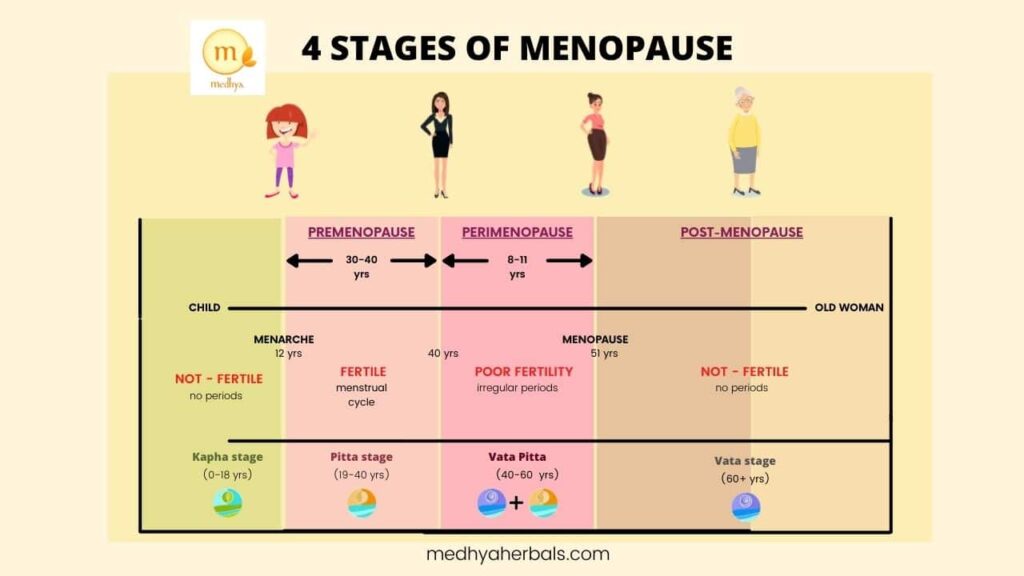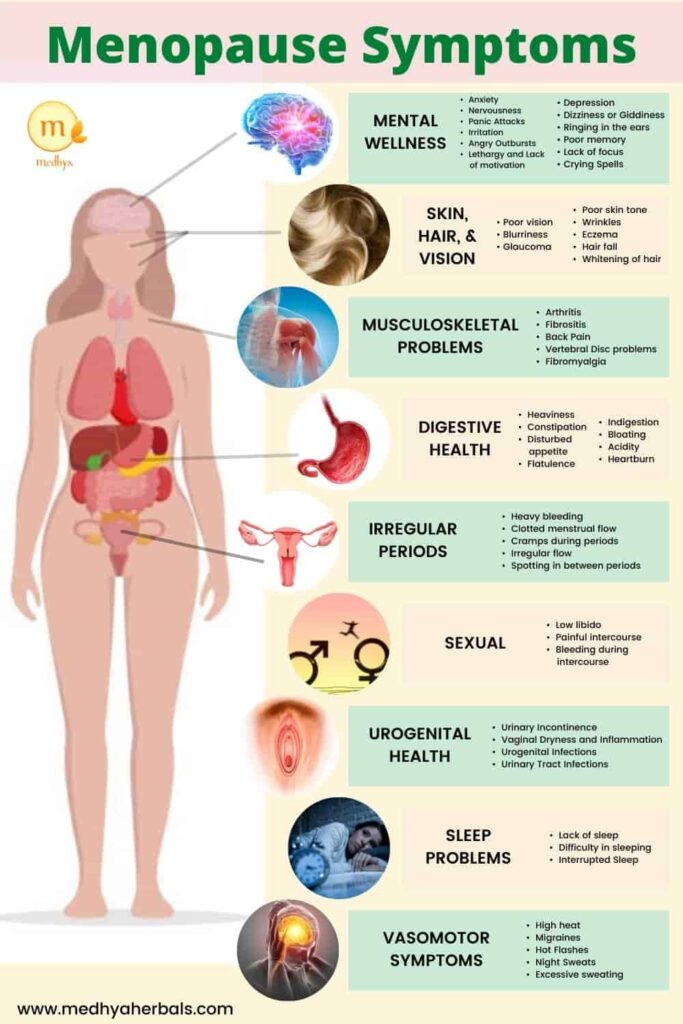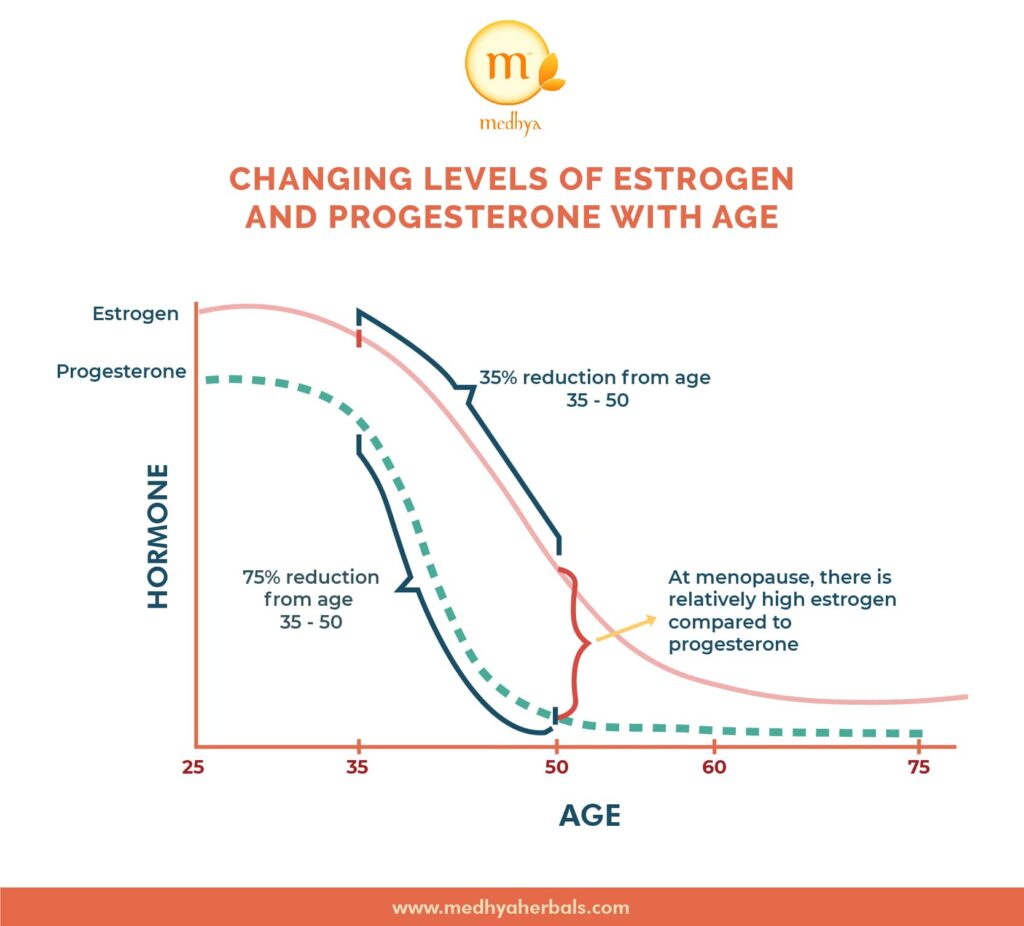Menopause is a universal experience for all women, yet the journey to it, specifically perimenopause, remains shrouded in mystery. As an Ayurvedic Doctor specializing in women’s health, I’ve guided countless women through this complex yet natural stage of life. This article is a deep dive into the subject of menopause, particularly on the signs perimenopause is ending.
Perimenopause, the transitional stage leading to menopause, affects women in profoundly different ways. Many experience a spectrum of perimenopause symptoms, ranging from hot flashes to mood changes, with variations in intensity and frequency. Understanding these symptoms, their progression, and identifying the stage you’re in, could be the key to finding relief and regaining control over your body.
Do symptoms get worse at the end of perimenopause? Is the last period before menopause heavier than usual? How can you balance your hormones and manage your diet to ease the transition? If these questions resonate with you, then you’re in the right place. In this comprehensive guide, we will uncover the truth about perimenopause, shedding light on these important issues while providing practical, natural solutions for symptom management.
As we navigate through this enlightening journey, you’ll gain the tools and knowledge needed to approach perimenopause with confidence and grace. So, let’s take this journey together, demystifying perimenopause, and empowering you to embrace this natural stage of life with understanding and ease.
What is Perimenopause?
Perimenopause, often termed ‘menopause transition,’ is the period in a woman’s life when her body begins the natural transition towards menopause and the end of her reproductive years. This phase is marked by the gradual decrease in the production of estrogen, a hormone vital for menstruation and fertility.
While the experience of perimenopause can vary greatly among women, it often involves a range of physiological changes and symptoms such as irregular periods, hot flashes, sleep disturbances, and mood changes.

The Different Stages of Perimenopause
Perimenopause is often divided into two main stages: early and late.
Early Perimenopause
In early perimenopause, estrogen levels start to fluctuate, and women might begin to experience changes in their menstrual cycle and the onset of perimenopausal symptoms. However, at this stage, menstruation still continues relatively regularly.
Late Perimenopause
Late perimenopause is characterized by significantly more irregular periods. Women may skip their periods for a few months, only to have them return later. This stage continues until menopause, defined as the point when a woman has gone 12 consecutive months without a menstrual period.
How to Identify Your Stage of Perimenopause
Identifying the stage of perimenopause you’re in largely depends on your menstrual cycle and the symptoms you’re experiencing.
In early perimenopause, changes may be subtle. You might notice slightly irregular periods or experience symptoms like mild hot flashes and mood swings.
In contrast, late perimenopause often brings more pronounced changes. Periods can become highly unpredictable, and perimenopausal symptoms may intensify. If you’ve gone several months without a period but then have one or more, you’re likely in late perimenopause.
Remember, these are general observations and experiences can vary. If you suspect you’re in perimenopause, a discussion with your healthcare provider or a specialist like an Ayurvedic doctor can provide more personalized insights and guidance.

The 34 Symptoms of Perimenopause
Perimenopause is a unique journey for every woman, with the intensity and variety of symptoms varying significantly. While the intensity and type of symptoms vary, the hormonal transition in perimenopause does lead to multiple symptoms, some more commonly known than others. Understanding these can help you manage this transitional phase better.
Here are the 34 symptoms often associated with perimenopause:
- Hot flashes
- Night sweats
- Irregular periods
- Mood swings
- Vaginal dryness
- Decreased fertility
- Changes in sexual desire
- Perimenopause insomnia or sleep problems
- Urinary issues
- Changes in breast tissue
- Fatigue
- Hair loss or thinning
- Memory problems
- Dizziness
- Menopause belly or excess belly fat
- Urinary Incontinence
- Bloating
- Allergies
- Brittle nails
- Changes in odor
- Irregular heartbeat
- Depression
- Anxiety
- Irritability
- Panic disorder
- Breast tenderness
- Joint pain
- Burning mouth syndrome
- Acne and skin breakouts in menopause
- Digestive problems
- Gum problems
- Muscle tension
- Itchy skin
- Tingling extremities
Remember, not all women will experience all these symptoms, and their intensity can fluctuate.
Signs Perimenopause is Ending
Perimenopause culminates in menopause, marking the end of a woman’s reproductive years. Typically, the cessation of your menstrual period for 12 consecutive months signals that perimenopause has ended and you’ve entered menopause. However, it’s not uncommon for periods to stop and start again during late perimenopause, which can cause confusion.
Regular check-ins with your doctor or a menopause specialist can help you accurately determine your stage. They can use information about your menstrual history, symptoms, and in some cases, hormone tests to clarify your status.
In addition, there are several signs and symptoms that can hint at the approaching end of perimenopause.

Irregular Menstruation and Longer Cycles
One of the hallmarks of late perimenopause is increasingly erratic periods. In early perimenopause, your periods may be slightly irregular but still somewhat predictable. As you move into late perimenopause, you may experience – longer cycles, heavier or lighter flows, longer gaps (60 days or more) between each period, or an increasing number of skipped periods. It’s also normal to have a period after several months of no bleeding.
You may skip periods only to have them return or find that the time between periods becomes significantly longer. These changes are typically a normal part of perimenopause, but if you’re concerned about any changes in your menstrual cycle, it’s always a good idea to consult with your healthcare provider.

Intensifying Perimenopause Symptoms
The last stage of perimenopause is often marked by significant hormonal fluctuations to help your body prepare for menopause. This can lead to an intensification of perimenopause symptoms.
While experiences vary widely, some women find that perimenopausal symptoms like hot flashes and night sweats intensify as they approach menopause. Others might start to experience new symptoms, such as vaginal dryness or changes in sexual desire. However, understanding that these symptoms are a normal part of the transition can help reduce anxiety.
- Hot flashes: These can become more frequent or severe as estrogen levels fluctuate and then decline.
- Irregular periods: Your periods may become increasingly irregular, with longer or shorter cycles, lighter or heavier flow, or missed periods altogether.
- Sleep disturbances: Hormonal changes can disrupt your sleep patterns, leading to insomnia or night sweats.
- Mood changes: Fluctuating hormones can also affect your mood, potentially causing irritability, anxiety, or depression.
- Vaginal dryness: Decreasing estrogen levels can lead to vaginal dryness and discomfort, particularly during sexual intercourse.
- Cognitive changes: Some women report difficulties with memory or concentration during the last stage of perimenopause.
Addressing the Horrors of Perimenopause
Perimenopause can bring on a barrage of physical and emotional changes that can feel overwhelming. These can include severe hot flashes, mood swings, insomnia, and anxiety. Moreover, the unpredictability of symptoms can cause distress, but it’s important to remember that it’s a natural part of aging, not a disease.
It’s also crucial to remember that while perimenopause can be tough, it’s not permanent, and there are various treatments available to manage the symptoms. This includes lifestyle changes, Ayurvedic natural treatment for menopause, herbal remedies and medical intervention as required.
Finally, it’s crucial to maintain open communication with your doctor and seek support from friends, family, or support groups. Sharing experiences and advice can make this challenging phase feel less isolating and more manageable.
Best Foods to Take for Hormone Balance in Perimenopause
Diet plays a crucial role in managing perimenopausal symptoms, primarily because it can influence hormone balance. Let’s explore how diet can help you navigate this significant life transition.
- Phytoestrogen-Rich Foods: Foods rich in phytoestrogens, like flaxseeds, soy products, and sesame seeds, can mimic the effects of estrogen in the body, which may help balance hormone levels during perimenopause.
- Fatty Fish: Fish like salmon, mackerel, and sardines are high in omega-3 fatty acids, which are known to support hormone health, reduce inflammation, and support mood and brain health.
- Leafy Greens and Cruciferous Vegetables: These nutrient-dense foods, such as spinach, kale, broccoli, and cabbage, provide essential vitamins and minerals, like magnesium and B vitamins, that support overall hormone health.
- High-Fiber Foods: Foods high in dietary fiber, like whole grains, fruits, and vegetables, can help regulate blood sugar and insulin levels, both of which can impact hormone balance.
- Protein-Rich Foods: Protein is crucial for hormone production. Including a variety of protein sources in your diet, such as lean meats, poultry, fish, eggs, dairy, legumes, and nuts, can support hormone health.
- Healthy Fats: In addition to omega-3s, other healthy fats, like those found in avocados, olive oil, nuts, and seeds, are crucial for hormone production and can help keep inflammation levels low.
- Fermented Foods: Foods like yogurt, kefir, sauerkraut, and kimchi can support gut health, which is closely linked to hormone balance.
What not to eat during Perimenopause?
During perimenopause, some foods can exacerbate symptoms and should ideally be limited or avoided:
- Caffeine: Stimulants like caffeine can trigger hot flashes and disrupt sleep, two common issues during perimenopause. Additionally, caffeine can deplete the body of essential nutrients like B vitamins and magnesium, which are vital for hormone balance.
- Alcohol: Similar to caffeine, alcohol can trigger hot flashes and disturb sleep. It can also lead to mood fluctuations and can interfere with the liver’s ability to regulate hormones.
- Sugar: Consuming high amounts of sugar can exacerbate hormonal imbalances, cause weight gain, and worsen mood swings. Sugar can also lead to inflammation and might increase the risk of health issues like heart disease and diabetes.
- Processed Foods: Foods that are highly processed often contain additives, preservatives, and artificial ingredients that can negatively affect hormone balance. They’re also typically high in salt, unhealthy fats, and sugars, all of which can contribute to weight gain, inflammation, and other health issues.
- High Sodium Foods: A high-sodium diet can lead to water retention and bloating, which might worsen perimenopausal symptoms. It can also contribute to high blood pressure.
- Trans Fats: These unhealthy fats, often found in fried foods and commercially baked goods, can lead to inflammation and weight gain, and might increase the risk of heart disease.
How to Treat Perimenopause Symptoms Naturally?
When treating perimenopause naturally, a holistic approach is often most beneficial. This could include:
- Dietary Changes: Incorporating more fruits, vegetables, lean proteins, and whole grains into your diet. Also, try to limit caffeine and alcohol, which can trigger hot flashes and disrupt sleep.
- Lifestyle Modifications: Engaging in regular physical activity, maintaining a healthy weight, and ensuring you get enough sleep can all help alleviate perimenopause symptoms.
- Mind-Body Practices: Techniques like yoga, tai chi, meditation, and deep-breathing exercises can help manage stress and enhance overall well-being.
- Natural Supplements: Some women find relief from symptoms with the help of herbal remedies or supplements. Always consult with a healthcare provider to ensure these are safe and right for you.
- Ayurvedic Remedies: As an Ayurvedic Doctor, I often recommend holistic Ayurvedic treatments for managing perimenopause symptoms. This could involve a combination of herbs, diet changes, and lifestyle practices tailored to your specific needs.
Remember, what works best will depend on your unique circumstances, including your symptoms, overall health, and personal preferences. Always consult with a healthcare provider before beginning any new treatment.
Conclusion
Navigating perimenopause can be a challenging journey, filled with a myriad of changes and uncertainties. We understand how daunting it can be to find relief, especially when dealing with an array of intense symptoms that seem to impact every aspect of your daily life. You’re not alone in this journey, and it’s crucial to remember that while this stage of life can be tough, it doesn’t have to be unbearable.
At Medhya Herbals, we believe in treating not just the symptoms but the root cause, providing long-lasting relief and helping you regain balance and vitality in your life. Ayurvedic treatments, tailored to your unique needs and circumstances, can provide a holistic approach to managing perimenopause symptoms. Our experienced Ayurvedic doctors specialize in women’s health and wellness, ensuring you receive a treatment plan that is as unique as you are.
Don’t endure the discomfort of perimenopause in silence. Schedule a consultation with our Medhya Herbals Ayurvedic doctors today and take the first step towards a personalized treatment plan that targets your specific needs. Together, we can navigate this journey towards balance, health, and well-being.
FAQ
Do symptoms get worse at the end of perimenopause?
Some women experience an intensification of symptoms as they progress from early to late perimenopause. You might notice hot flashes becoming more frequent or severe, increased mood swings, or worsening sleep problems. However, it’s important to note that every woman’s experience is unique. For some, symptoms remain relatively constant throughout perimenopause, while others may even see an improvement in certain symptoms over time.
Why is perimenopause still such a mystery?
The main reason perimenopause remains a mystery is its inherent variability. No two women’s experiences are exactly alike. Symptoms, their severity, and their duration can greatly differ from woman to woman. Moreover, while researchers understand the general hormonal changes that occur during perimenopause, the precise interplay of hormones and how they influence each woman’s experience isn’t fully understood.
Another reason perimenopause can seem mysterious is societal. There has been a historical lack of open conversation about this phase, leading to misunderstandings and misinformation. Fortunately, this is changing, and more research and discussion are being dedicated to women’s health issues, including perimenopause.
How do you know when your periods are coming to an end?
One of the most common signs that your periods are coming to an end, signaling the end of perimenopause and the start of menopause, is the increasing irregularity of your menstrual cycles. This can mean skipped periods, periods that are closer together or farther apart, and changes in flow, whether lighter or heavier. Many women may also go several months without a period and then have one or two final periods. When you have gone a full year without having a period, you’ve officially reached menopause. However, it’s essential to discuss these changes with your healthcare provider to rule out other potential causes and to understand your personal transition to menopause better.
Is last period before menopause heavy?
The nature of the last period before menopause can vary widely from woman to woman, just like the perimenopausal transition itself. Some women might experience a heavier-than-usual period, while others might have a lighter one. Some women might not notice any significant difference at all. Irregular periods, both in terms of cycle length and flow, are common during perimenopause due to fluctuating hormone levels. If you experience a significant change, like an extremely heavy period or bleeding between periods, it’s important to consult with your healthcare provider to rule out other potential health issues.
Is it normal to still have a period at 53?
Yes, it’s entirely normal to still have periods at the age of 53. The age at which a woman reaches menopause, defined as one full year without a period, can vary widely, with the average age being 51 in the United States. However, many women continue to have periods into their mid-50s. It’s important to note that if your periods are still regular and you’re not experiencing any other symptoms of perimenopause or menopause, this is not typically a cause for concern. However, you should always consult with your healthcare provider if you have any concerns or notice any significant changes in your menstrual cycle.
What vitamins are good for perimenopause?
Several vitamins can be beneficial during perimenopause, due to their ability to help manage symptoms and maintain your overall health during this transition. Vitamin E, for instance, is known for its antioxidant properties and may help reduce hot flashes. B vitamins, particularly B6 and B12, can improve energy, support mood, and promote heart health. Vitamin D is essential for calcium absorption, supporting bone health to counteract the increased risk of osteoporosis during perimenopause. Vitamin C, besides its antioxidant benefits, can support adrenal health and may help lessen hot flashes. Always remember to consult with a healthcare provider before starting any new supplement regimen to ensure it’s safe and suitable for your specific needs.

